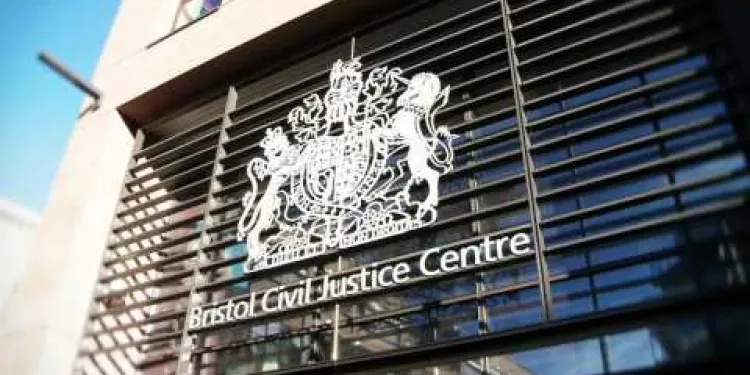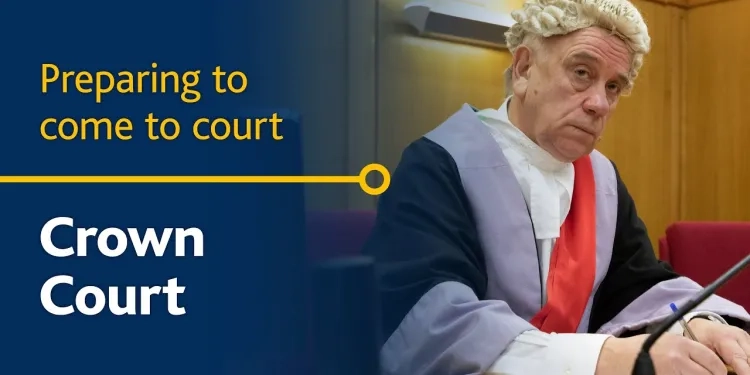Find Help
More Items From Ergsy search
-

Magistrates in the Family Court: A Private Law Case
Relevance: 100%
-

Magistrates in the Family Court: A Public Law Case
Relevance: 83%
-

What are the changes to Family Court Law in 2026?
Relevance: 45%
-

How does the type of case impact the court schedule?
Relevance: 40%
-

The Crown Court
Relevance: 39%
-

The Family Court without a Lawyer - Video 1 of 3
Relevance: 39%
-

What are the new protocols for domestic violence cases in family court in 2026?
Relevance: 38%
-

Are there any changes to surrogacy arrangements under the 2026 family court law?
Relevance: 37%
-

The Family Court without a Lawyer
Relevance: 36%
-

What changes have been made to mediation in family law cases in 2026?
Relevance: 36%
-

How quickly can a criminal case come to court?
Relevance: 35%
-

Navigating Post-Brexit Family Law Changes
Relevance: 34%
-

How to represent yourself in family court in England and Wales
Relevance: 34%
-

Navigating Changes in Family Law Post-Brexit
Relevance: 33%
-

How long does it take for a case to come to court?
Relevance: 33%
-

The Family Court without a Lawyer - Video 2 of 3
Relevance: 33%
-

Are there modifications to legal aid access in family court for 2026?
Relevance: 32%
-

Impacts of Recent Changes to Family Law Legislation
Relevance: 32%
-

Does the location of the court affect case timing?
Relevance: 32%
-

What are the key changes to family court law in 2026?
Relevance: 32%
-

Is there a standard minimum or maximum time for a case to reach court?
Relevance: 32%
-

The Family Court without a Lawyer - Video 3 of 3
Relevance: 32%
-

How To Prove Narcissistic Abuse In Family Court UK
Relevance: 31%
-

Child Care Proceedings | Family Law
Relevance: 30%
-

What digital services have been introduced in family courts in 2026?
Relevance: 30%
-

How do court holidays affect the timeline for a case to come to court?
Relevance: 30%
-

Supreme Court to Hear Landmark Case on Environmental Regulations
Relevance: 29%
-

Have the rights of same-sex couples been affected by the 2026 family court changes?
Relevance: 28%
-

How does the availability of judges affect the timing of a case coming to court?
Relevance: 28%
-

Does the jurisdiction affect how long it takes for a case to come to court?
Relevance: 27%
-

What factors affect the time it takes for a case to come to court?
Relevance: 27%
-

What is a typical timeline for a civil case to come to court?
Relevance: 27%
-

Have the rules for changing a child's name in family court changed in 2026?
Relevance: 27%
-

What impact can unexpected events have on the court scheduling of a case?
Relevance: 27%
-

How does a backlog in the court system affect case scheduling?
Relevance: 26%
-

Can legal representation speed up the process of a case coming to court?
Relevance: 26%
-

What is the status of joint custody provisions in the 2026 family court updates?
Relevance: 26%
-

How have prenup agreements been affected by the 2026 family court changes?
Relevance: 25%
-

Navigating Child Custody Laws in the UK
Relevance: 25%
-

Crown Court - Preparing to come to court
Relevance: 25%
Understanding the Role of Magistrates in the Family Court: A Private Law Case
Introduction to Magistrates in Family Court
In the United Kingdom, magistrates play a crucial role in the family court, particularly in private law cases. They are volunteer judicial officers who are not legally qualified but receive extensive training to ensure they can make fair and informed decisions. Private law cases typically involve disputes between parents or guardians regarding child arrangements, such as custody, visitation rights, and parental responsibilities.
The Responsibilities of Magistrates in Private Law Cases
Magistrates in family courts handle various responsibilities, including assessing and deciding on cases involving child arrangements orders, specific issue orders, and prohibited steps orders. They listen to the evidence presented by both parties, evaluate the welfare of the child, and make decisions that are in the child's best interests. Magistrates must be impartial and fair, giving both parties an equal opportunity to present their case.
The Process of Magistrates' Decision-Making
When dealing with a private law case, magistrates follow a structured process. They review all submitted evidence, including written statements, expert reports, and testimonies during hearings. Magistrates carefully consider the 'welfare checklist' outlined in the Children Act 1989, which includes factors such as the child's wishes and feelings, physical and emotional needs, the impact of any changes in circumstances, and any harm or risk of harm. Based on this assessment, magistrates deliver their judgement.
The Importance of Training and Support
Although magistrates are not legally trained professionals, they receive extensive training and ongoing support to equip them with the necessary skills and knowledge. This training covers legal principles, child psychology, effective communication, and decision-making. Additionally, magistrates usually sit in panels of three, which helps them reach balanced and well-considered decisions through collective discussion and deliberation.
Appeals and Challenges to Magistrates' Decisions
The decisions made by magistrates in family court can be challenged through an appeal process. If a party believes that a magistrate's decision is unjust or legally incorrect, they can appeal to a higher court. It is essential to seek legal advice when considering an appeal, as this process can be complex and requires substantial evidence to demonstrate why the original decision should be reconsidered.
Conclusion
Magistrates in the UK family courts play a vital role in resolving private law cases by making decisions that prioritize the welfare and best interests of children involved in parental disputes. Their impartial judgement, thorough training, and support system ensure they are well-equipped to handle the complexities of family law while maintaining fairness and justice.
Understanding the Role of Magistrates in the Family Court: A Private Law Case
Introduction to Magistrates in Family Court
In the UK, magistrates are important in family courts. They help solve problems in private cases between parents, like who a child lives with or sees. Magistrates are not lawyers, but they learn a lot to make fair decisions. They give their time to help.
The Responsibilities of Magistrates in Private Law Cases
Magistrates have many jobs in family courts. They listen to both sides and make decisions about where children will live and who they will see. They must be fair to everyone and think about what is best for the child.
The Process of Magistrates' Decision-Making
Magistrates follow steps to make decisions. They read all the information, like letters and reports. They listen to people talk in court. They think about what is best for the child, like the child's feelings and safety. Then, they decide what should happen.
The Importance of Training and Support
Magistrates are not lawyers, but they get a lot of training. They learn about law, children, and how to talk well. Magistrates work in groups of three, so they can talk and decide together. This helps them make good decisions.
Appeals and Challenges to Magistrates' Decisions
If someone thinks a magistrate made a wrong decision, they can ask a higher court to look at it again. This is called an appeal. It is important to get legal help because appeals can be hard and need a lot of proof to show why the decision should change.
Conclusion
Magistrates help decide what is best for children when parents disagree. They are fair and have a lot of training to help them make good decisions. Their work in family courts is very important for children’s happiness and safety.
Frequently Asked Questions
What is the role of magistrates in the Family Court?
Magistrates in the Family Court handle family law cases such as child custody, adoption, and divorce proceedings. They aim to protect the welfare of children and ensure fair outcomes for families.
Do magistrates get paid for their work in the Family Court?
Magistrates in the UK are volunteers and do not receive a salary. However, they are reimbursed for travel and other reasonable expenses incurred while performing their duties.
How are magistrates appointed in the Family Court?
Magistrates are appointed by the Lord Chancellor and undergo thorough training. They come from a variety of backgrounds and are expected to bring diverse perspectives to the bench.
Do magistrates need legal qualifications?
No, magistrates do not require legal qualifications. They receive specialized training and work alongside legal advisors who provide guidance on points of law.
How do magistrates make decisions in private law cases?
Magistrates make decisions based on the evidence presented, the law, and the best interests of the children involved. They strive to ensure that any decision prioritizes child welfare.
Can I appeal a decision made by magistrates in the Family Court?
Yes, you can appeal a decision made by magistrates. Appeals are usually heard by a judge in a higher court. Legal advice is recommended if you are considering an appeal.
How long do cases in the Family Court typically take?
The duration of a case varies depending on its complexity. Simple cases may be resolved quickly, while more complex cases can take several months or even longer.
Can I represent myself in the Family Court?
Yes, individuals are allowed to represent themselves in the Family Court. However, it might be beneficial to seek legal advice to understand your rights and the court process.
What is a child arrangement order?
A child arrangement order sets out the arrangements for where a child will live, with whom they will spend time, and other specific issues concerning the child's welfare.
What should I do if I cannot attend a scheduled court hearing?
If you cannot attend a scheduled court hearing, you should inform the court as soon as possible. The court may reschedule the hearing or make other arrangements.
Are the proceedings in the Family Court public?
Family Court proceedings are typically private to protect the interests of children and families involved. Only those directly involved in the case and their legal representatives attend.
What factors do magistrates consider in child custody cases?
Magistrates consider factors such as the child’s wishes and feelings, the capability of each parent to meet the child's needs, and any potential risks to the child's welfare.
Can a magistrate's decision be influenced by media coverage?
Magistrates are required to make decisions solely based on the evidence presented in court and the relevant law. Media coverage should not influence their decision-making.
What is the difference between a magistrate and a judge in the Family Court?
Magistrates are volunteers who do not require legal qualifications, while judges are qualified legal professionals. Judges typically handle more complex cases, whereas magistrates deal with less complex matters.
How can I prepare for a hearing in the Family Court?
To prepare for a hearing, gather all relevant documents, understand the details of your case, consider seeking legal advice, and be ready to present your evidence clearly and concisely.
What do magistrates do in the Family Court?
Magistrates are people who help make decisions in the Family Court. They listen to what everyone has to say. Then, they decide what is best for families and children.
If you find this hard to read, try asking someone to read it with you. You can also use tools like text-to-speech apps to help you understand better.
Magistrates in the Family Court handle cases about families. This includes things like who takes care of children, adopting children, and divorce. They work to keep children safe and to be fair to families.
Do Magistrates Get Paid for Helping in Family Court?
Magistrates are special people who help in court. They are not paid money for their work. This means they do it because they want to help the community.
If you find reading hard, you can use a ruler or your finger to keep your place on the page. You can also ask someone to read it with you.
Magistrates in the UK are people who help in courts.
They do not get paid like a job. They are volunteers.
But they can get back money if they spend it on travel or other things they need to do their work.
How do people become judges in the Family Court?
Here is how someone can become a judge in the Family Court:
- A person must apply for the job.
- They must have special training.
- They need to be good at making fair decisions.
- A group chooses who becomes a judge.
Tools like picture dictionaries or apps that read text aloud can help understand this better.
Magistrates are picked by the Lord Chancellor and get lots of training. They come from different places and have different ideas, which helps them make fair decisions.
Do magistrates need to have special law training?
No, magistrates do not need special law training. You don't need to be a lawyer to be a magistrate.
Magistrates get training when they start. They also have someone to help them in court.
If you want to know more or get help, you can:
- Ask a teacher or parent to explain.
- Use pictures or videos about magistrates.
- Find a book with simple words about being a magistrate.
No, you don't need to be a lawyer to be a magistrate. Magistrates get special training to help them do their job. They also have legal advisors who help them understand the law.
How do magistrates decide in family law cases?
Magistrates make decisions about family cases, like when parents separate. They listen to both sides and gather all important information. They think about what is best for the children.
To help you understand:
- Ask someone to explain any hard words.
- Use pictures or drawings to see what is happening.
- Take breaks if the information feels too much.
Remember, magistrates want to help everyone do what is best for the family and children.
Magistrates are people who make important decisions. They look at all the facts, think about the law, and want what is best for the children. They make sure any decision is good for the children.
Can I ask for a different answer if the Family Court says something I don't like?
Yes, you can ask for a different answer. This is called an "appeal".
If you think the Family Court made a mistake, you can tell another judge. This is how you ask them to look at it again.
You might need help to do this. A grown-up or a lawyer can help you.
It's important to ask soon after the court's decision. Don't wait too long.
If you need help, tools you can use are:
- Ask someone to read it to you
- Use pictures to understand better
- Talk to a helper at school or a local advice center
Yes, you can ask for a different decision if you do not agree with what the magistrates said. A judge in a bigger court will listen to your appeal. It is a good idea to talk to a lawyer if you want to do this.
How long does it take in Family Court?
Family Court cases can take some time. It is different for every case.
Sometimes, it can take a few months.
If the case is complicated, it might take longer. It could take a year or more.
If you have trouble understanding, you can ask someone to help. Use a calendar to mark important dates.
How long a case takes to finish can be different. Easy cases finish fast. Harder cases can take many months or more.
Can I Speak for Myself in Family Court?
Yes, you can speak for yourself in Family Court. This is called being a 'litigant in person'.
Here are some tips to help you:
- Prepare Your Papers: Make sure you have all the important papers you need.
- Ask for Help: You can ask a friend or family member to help you understand the papers.
- Simple Language: Use simple words when you speak in court.
- Note-Taking: Write down what you want to say, so you don't forget.
- Online Resources: There are online videos and guides that can help you understand what to do.
It's okay to be nervous. Just try your best!
Yes, you can speak for yourself in Family Court. But, it can help to talk to a lawyer. They can explain your rights and how the court works.
What is a child arrangement order?
A child arrangement order is a decision by a judge about who a child lives with and who they spend time with. It is like a set of rules to help families decide what is best for the child.
Helpful Tips:
- Use pictures to help understand who the child will live with.
- Talk to someone you trust if you need more help.
- Draw a simple schedule to show when the child will see each person.
A child arrangement order is a plan for where a child will live. It tells us who the child will spend time with. It also covers other important things about the child's well-being.
What should I do if I can't go to court when I am supposed to?
If you can't go to court on the day you're supposed to, here's what you can do:
- Tell Someone: Let the court know as soon as you can. You can call or write a letter.
- Get Proof: If you are sick, get a doctor's note. If you have another reason, explain it clearly.
- See if You Can Change the Date: Ask if you can come to court on a different day.
- Use Support Tools: You might find it helpful to use calendars or reminders to keep track of dates.
Always try to let the court know what is happening. They will help you understand what to do next.
If you cannot go to your court meeting, tell the court right away. The court might change the meeting date or make other plans.
Can everyone see what happens in Family Court?
The Family Court is private. This means most people cannot watch what happens. Only the people involved can go inside. This helps keep families safe and their stories private.
If you want to understand this better, you can ask a teacher or a helper to explain it. You can also use pictures or stories to learn more about Family Court.
Family Court meetings are private. This is to keep children and families safe. Only the people in the case and their lawyers can go.
What do judges think about when choosing who takes care of a child?
When judges decide who a child will live with, they think about many things. Here are some important ones:
- Child's Safety: Is the child safe at home?
- Child's Happiness: Is the child happy and comfortable?
- Child's Needs: Does the child have everything they need like food and a bed?
- Family Bond: Can the child see both parents and family?
- Child's Voice: What does the child want?
If you find it hard to read, ask someone to help you. You can also use pictures or videos to understand better.
Magistrates look at things like what the child wants and feels, how well each parent can take care of the child, and any possible dangers to the child's well-being.
Here are some helpful tips to understand this:
- Think about what the child wants and how they feel.
- See how well each parent can look after the child.
- Check if there are any dangers to the child’s safety or happiness.
You can use tools like pictures or simple charts to help explain these ideas. Talking with someone you trust can also help make things clearer.
Does the news affect what a magistrate decides?
The news includes TV, newspapers, and the internet. These can sometimes affect what people think. A magistrate is a person who makes decisions in court. They listen to both sides and decide what is fair. Can the news change what a magistrate thinks? It's an important question.
If you want to learn more, you can:
- Ask someone to explain it to you.
- Use simple news websites for kids.
Magistrates must make choices based only on the proof they see in court and the law. They should not let news stories change their decisions.
How is a magistrate different from a judge in the Family Court?
A magistrate and a judge are both important people in the Family Court. They help make decisions about families.
Magistrate:
- Handles smaller cases.
- Makes quicker decisions.
- Works in local courts.
Judge:
- Handles bigger and more serious cases.
- Spends more time making decisions.
- Works in higher courts.
Helpful Tools:
- Use pictures to understand better.
- Ask someone to explain or read it with you.
- Write down questions you have.
Magistrates are people who help in court. They do not need to be lawyers. Judges are trained lawyers. Judges work on hard cases. Magistrates work on easier cases.
How can I get ready for a Family Court hearing?
Going to Family Court can be important. Here's how to get ready:
- Ask for help: Talk to a friend, family member, or support worker.
- Use helpful tools: Make a list of what you want to say and bring it with you.
- Practice: Try talking about your case with someone you trust.
- Take care: Make sure you eat and rest well before the hearing.
Being ready can help you feel more calm and confident.
Before going to a hearing, you should do a few things. First, collect all important papers you have. Next, learn about your case. It might be a good idea to ask a lawyer for help. Finally, practice talking about your evidence so you can explain it easily and clearly.
Useful Links
This website offers general information and is not a substitute for professional advice.
Always seek guidance from qualified professionals.
If you have any medical concerns or need urgent help, contact a healthcare professional or emergency services immediately.
Some of this content was generated with AI assistance. We’ve done our best to keep it accurate, helpful, and human-friendly.
- Ergsy carfully checks the information in the videos we provide here.
- Videos shown by Youtube after a video has completed, have NOT been reviewed by ERGSY.
- To view, click the arrow in centre of video.
- Most of the videos you find here will have subtitles and/or closed captions available.
- You may need to turn these on, and choose your preferred language.
- Go to the video you'd like to watch.
- If closed captions (CC) are available, settings will be visible on the bottom right of the video player.
- To turn on Captions, click settings .
- To turn off Captions, click settings again.
More Items From Ergsy search
-

Magistrates in the Family Court: A Private Law Case
Relevance: 100%
-

Magistrates in the Family Court: A Public Law Case
Relevance: 83%
-

What are the changes to Family Court Law in 2026?
Relevance: 45%
-

How does the type of case impact the court schedule?
Relevance: 40%
-

The Crown Court
Relevance: 39%
-

The Family Court without a Lawyer - Video 1 of 3
Relevance: 39%
-

What are the new protocols for domestic violence cases in family court in 2026?
Relevance: 38%
-

Are there any changes to surrogacy arrangements under the 2026 family court law?
Relevance: 37%
-

The Family Court without a Lawyer
Relevance: 36%
-

What changes have been made to mediation in family law cases in 2026?
Relevance: 36%
-

How quickly can a criminal case come to court?
Relevance: 35%
-

Navigating Post-Brexit Family Law Changes
Relevance: 34%
-

How to represent yourself in family court in England and Wales
Relevance: 34%
-

Navigating Changes in Family Law Post-Brexit
Relevance: 33%
-

How long does it take for a case to come to court?
Relevance: 33%
-

The Family Court without a Lawyer - Video 2 of 3
Relevance: 33%
-

Are there modifications to legal aid access in family court for 2026?
Relevance: 32%
-

Impacts of Recent Changes to Family Law Legislation
Relevance: 32%
-

Does the location of the court affect case timing?
Relevance: 32%
-

What are the key changes to family court law in 2026?
Relevance: 32%
-

Is there a standard minimum or maximum time for a case to reach court?
Relevance: 32%
-

The Family Court without a Lawyer - Video 3 of 3
Relevance: 32%
-

How To Prove Narcissistic Abuse In Family Court UK
Relevance: 31%
-

Child Care Proceedings | Family Law
Relevance: 30%
-

What digital services have been introduced in family courts in 2026?
Relevance: 30%
-

How do court holidays affect the timeline for a case to come to court?
Relevance: 30%
-

Supreme Court to Hear Landmark Case on Environmental Regulations
Relevance: 29%
-

Have the rights of same-sex couples been affected by the 2026 family court changes?
Relevance: 28%
-

How does the availability of judges affect the timing of a case coming to court?
Relevance: 28%
-

Does the jurisdiction affect how long it takes for a case to come to court?
Relevance: 27%
-

What factors affect the time it takes for a case to come to court?
Relevance: 27%
-

What is a typical timeline for a civil case to come to court?
Relevance: 27%
-

Have the rules for changing a child's name in family court changed in 2026?
Relevance: 27%
-

What impact can unexpected events have on the court scheduling of a case?
Relevance: 27%
-

How does a backlog in the court system affect case scheduling?
Relevance: 26%
-

Can legal representation speed up the process of a case coming to court?
Relevance: 26%
-

What is the status of joint custody provisions in the 2026 family court updates?
Relevance: 26%
-

How have prenup agreements been affected by the 2026 family court changes?
Relevance: 25%
-

Navigating Child Custody Laws in the UK
Relevance: 25%
-

Crown Court - Preparing to come to court
Relevance: 25%


